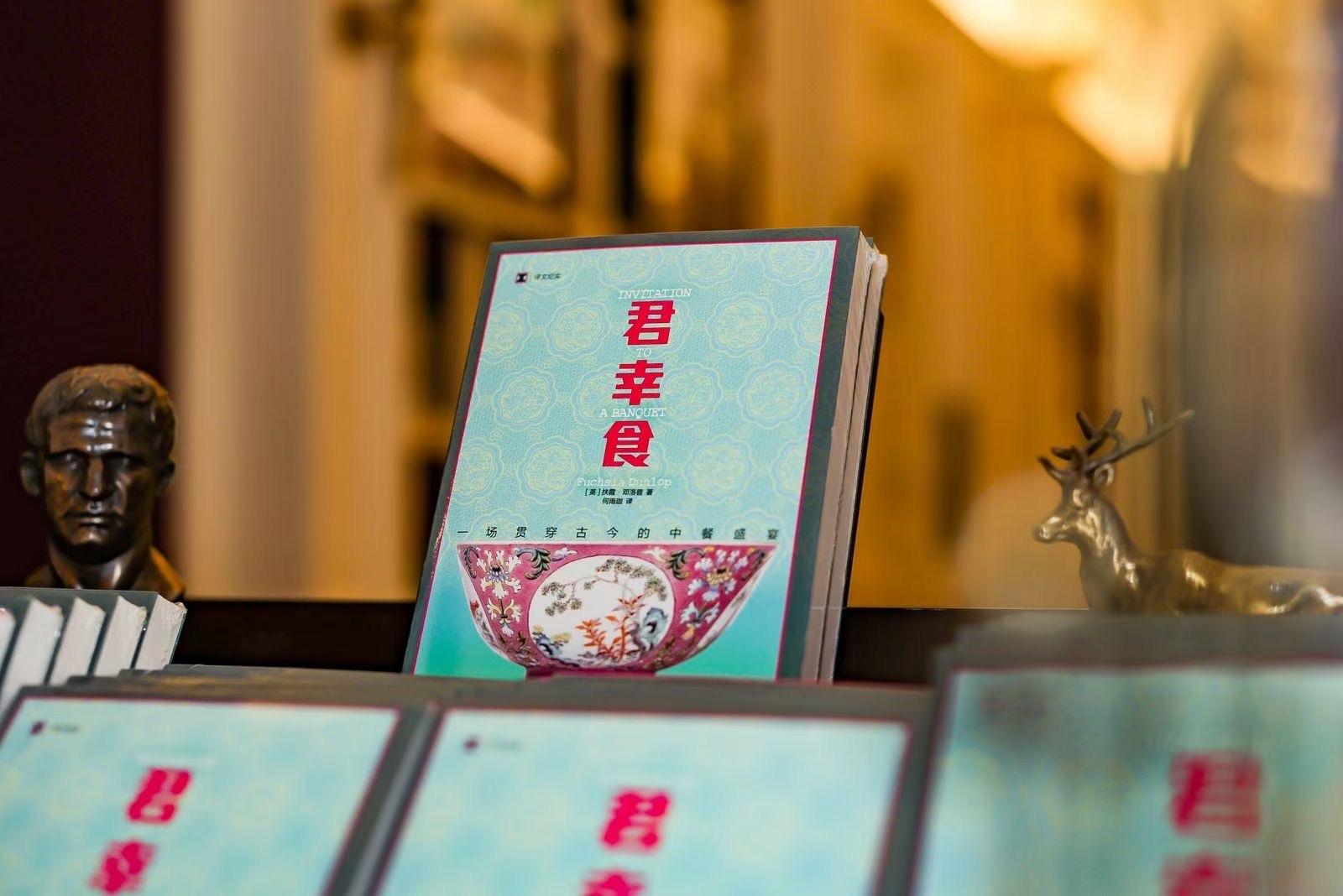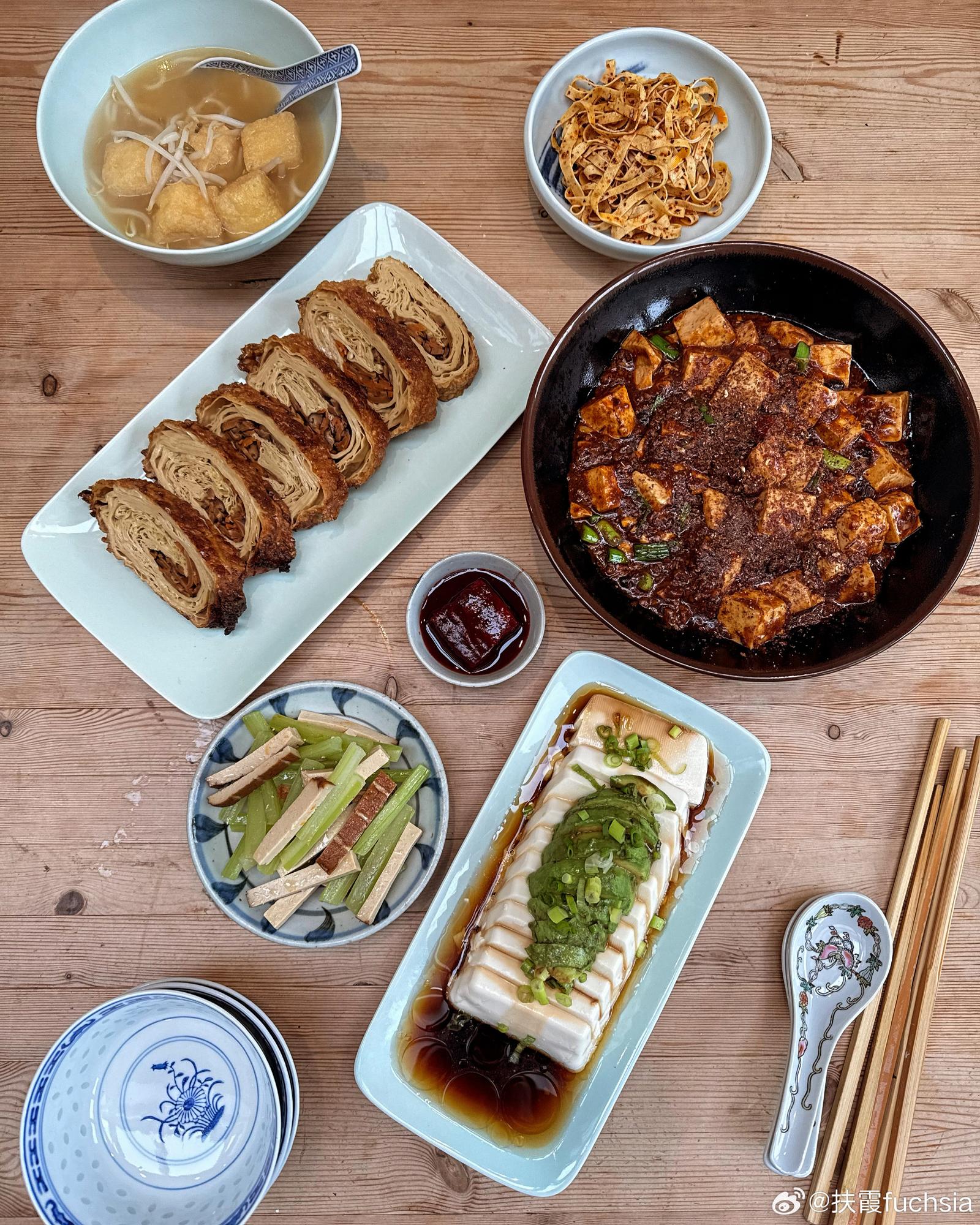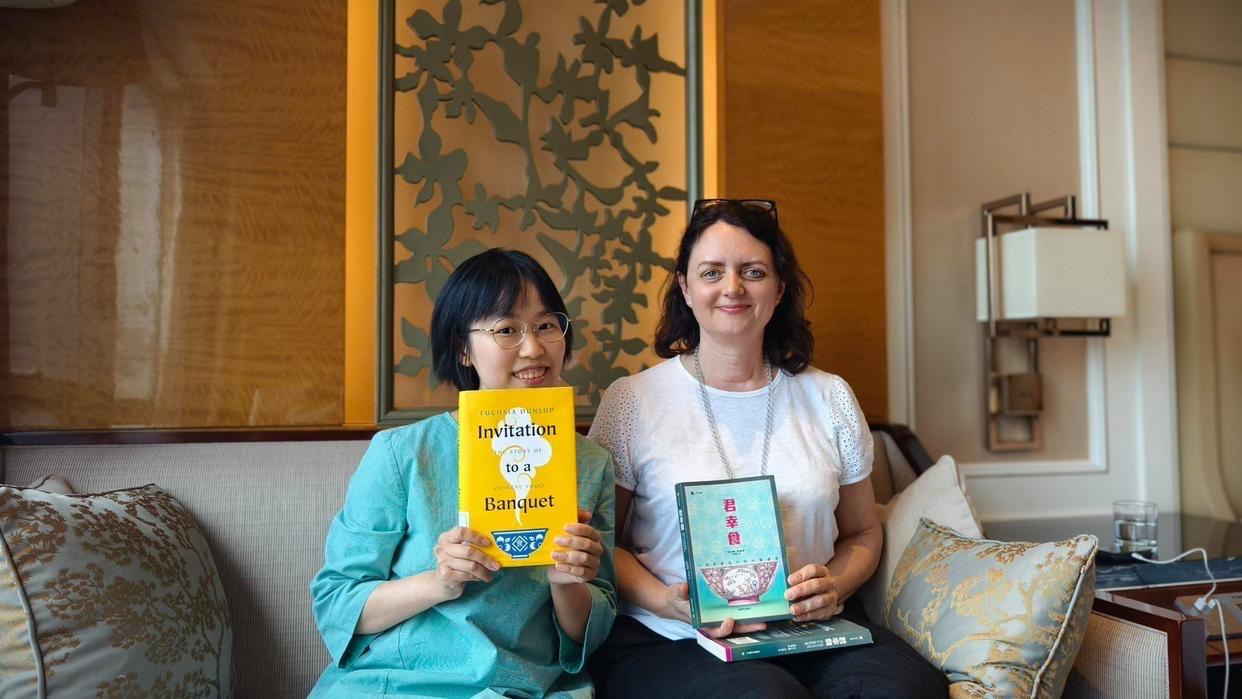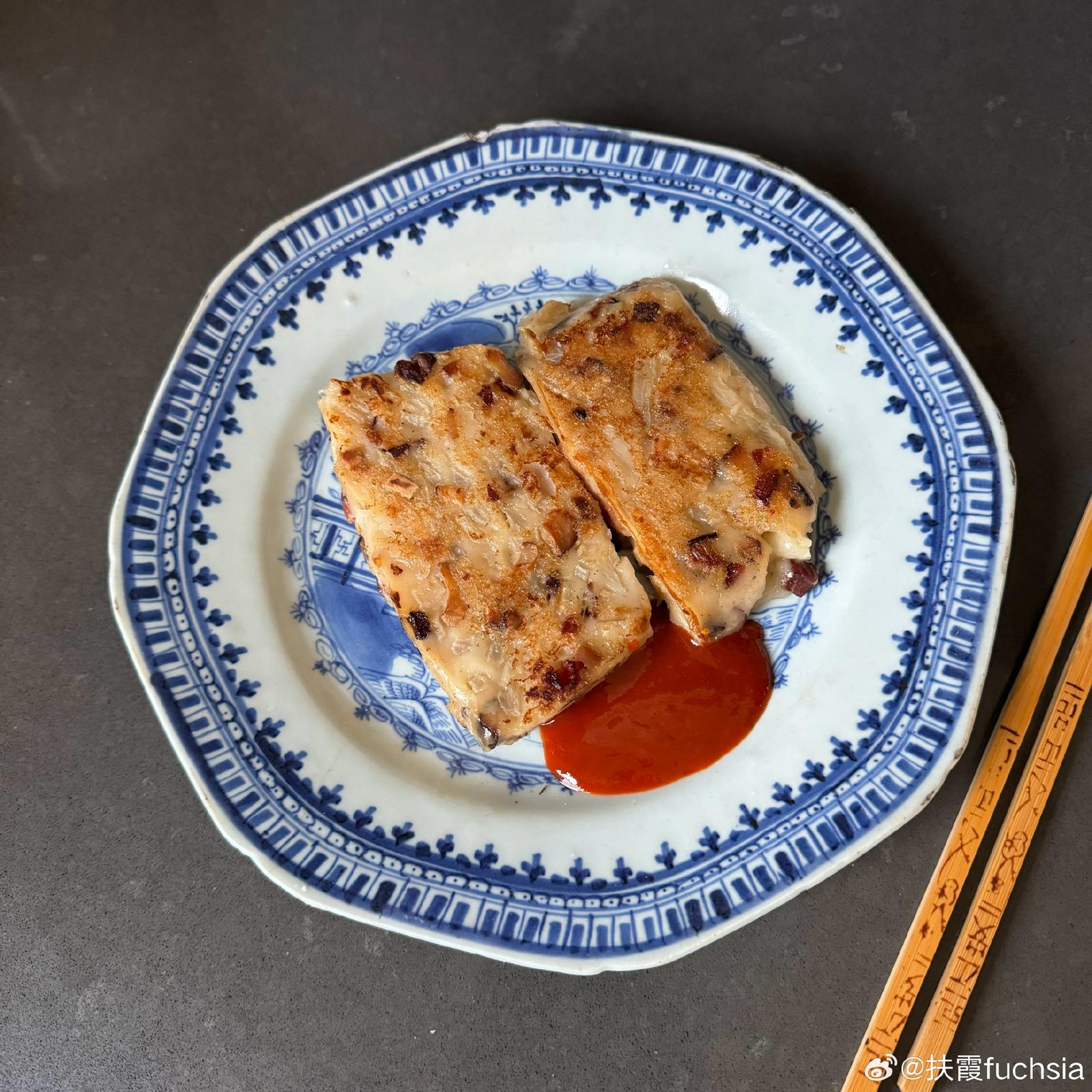
Recently, British writer Fuchsia Dunlop's new work "Invitation to a Banquet" was released by Shanghai Translation Publishing House.
Fuchsia grew up in Oxford, England, graduated from the University of Cambridge with a degree in English Literature, and later obtained a master's degree in Chinese Studies from the School of Oriental and African Studies, University of London. Since 1994, when she came to China on a scholarship from Sichuan University, Fuchsia has been immersed in Chinese cuisine for 30 years. "Invitation to a Banquet" is her painstaking work in studying the culture and history of Chinese cuisine over the past three decades.

The title of the book "Invitation to a Banquet" comes from a lacquered food plate with a civet cat pattern unearthed from the Mawangdui tomb of the Western Han Dynasty (206 BC-AD 24) in Changsha city, with "Invitation to a Banquet" written by vermilion in the gaps between the cloud patterns inside the plate, aiming to encourage you to enjoy delicious food, reflecting the profound cultural heritage of Chinese cuisine. The Chinese title also complements the English version of "Invitation to a Banquet", which means inviting you toattend a banquet and have a good meal and drink.
Last month, Fuchsia and her friends visited Guangdong again for Cantonese cuisine. She spoke highly of the steamed eggs with standing grain worms, withthe roast goose and seafood being her favorites. In her opinion, Cantonese cuisine is excessively refined, appearing light but actually taking a lot of effort.
In "Invitation to a Banquet", Fuchsia's favorite chapter is "braised pomelo pith with shrimp eggs", which is also one of her favorite traditional Cantonese dishes.

"Pomelo peel doesn't look like an ingredient at all since it looks like a pile of cotton wool. Therefore, in other countries around the world, people would throw it into the trash without hesitation. However, the chefs in Guangdong have found a way to make this ingredient so delicious."
Fuchsia believes that chefs around the world differ in attitudes towards ingredients, which is a philosophically different way of thinking about the world.
"Western chefs may ask, 'Is this edible?' while Chinese chefs wouldsay, 'How can I turn it into something edible?' The seemingly unattractive pomelo peel is transformed into a delicious dish by Chinese chefs using their imagination and cooking skills. Not only does it avoid waste, but it is also full of creativity and ingenuity, which I think is part of the art and culture of Chinese cuisine."

For thousands of years, the Chinese havebeen leading the way in innovative cooking, and it's been very progressive and bold. Fuchsia added, "This cheerful, intelligent, and even humorous approach to innovation is like a textbook for us to learn how to make the most of any potential ingredient at hand, whether it's jellyfish or pomelo peel."
In the face of Michelin restaurants, an entirely Western evaluation system, Fuchsia also has her own views.
"On the one hand, it's a good thing that international foodies start to recognize and embrace Chinese cuisine, and they will also promote Chinese cuisine abroad. However, for Chinese restaurants, Michelin's evaluation criteria may not necessarily be reasonable."
Fuchsia said that Chinese people have always had high demands for food, and there is no need for Chinese chefs to cater to Michelin's evaluation standards.
Currently, in addition to writing, Fuchsia also serves as a consultant for restaurants in the UK, inviting international friends on food-tasting trips to China. Next, she will continue to write stories about Chinese cuisine, leading more people to understand and taste Chinese cuisine.
Source: Yangcheng Evening News
扶霞:最懂中国菜的英国剑桥学霸,为传统粤菜的智慧所折服
近日,英国作家扶霞·邓洛普新作《君幸食》由上海译文出版社推出。
扶霞成长在英国牛津,毕业于剑桥大学英国文学专业,后来在伦敦亚非学院中国研究专业获得硕士学位。自1994年拿到四川大学留学生奖学金来到中国旅居,扶霞沉醉于中餐的美食世界已有30年。而《君幸食》正是她这三十年来研究中餐文化和历史的心血之作。
书名《君幸食》来自长沙马王堆汉墓出土的狸猫纹漆食盘,食盘内云纹间隙处朱书“君幸食”,意在劝君享用美食,体现了中国饮食文化的深厚底蕴。《君幸食》也与英文版书名《Invitation to a Banquet》相得益彰,请君赴宴,吃好喝好。

上个月,扶霞和朋友们又一次来到广东“觅食”。禾虫蒸蛋让她赞不绝口,烧鹅和海鲜也是她的挚爱。在她看来,粤菜十分考究,看上去清淡,实际上很花功夫。
在《君幸食》中,扶霞最喜欢的一章是“虾籽柚皮”,这也是她最喜欢的传统粤菜之一。
“因为柚皮看上去完全不像一种食材,在世界上其他国家,人们会毫不犹豫把它扔进垃圾桶,因为它看起来就像一堆棉絮。但广东的厨师们找到了让这个原料变得如此美味的烹饪方法,让这种神奇的食材变得非常可口。”

扶霞认为,不同国家的厨师对待食材截然不同的态度,其实也是看待世界的哲学式的不同思维。
“西方厨师可能会问,这个东西能吃吗?而中国厨师会说,我怎么才能把它变成能吃的东西?看上去毫无吸引力的柚皮,中国厨师利用想象力和烹饪技术,把它变成一道美味佳肴,不仅避免了浪费,而且充满创意和智慧,我认为这是中餐艺术和文化的一部分。”
千百年来,中国人其实一直在引领着创新烹饪的潮流,且十分激进大胆。扶霞说:“这种快乐、睿智甚至幽默的创新方式,就像一本教科书,让我们学习如何充分利用手头任何的潜在食材,无论是海蜇还是柚皮。”
而面对米其林餐厅这一完全来自西方的评价体系,扶霞也有自己的看法。
“一方面是国际美食家开始承认和接纳中国美食,他们也会在国外宣传中国美食,这是好事。但对于中餐厅来说,米其林的评价标准并不一定合理。”
扶霞说,中国人对吃的要求一直很高,中国厨师也完全没有必要去迎合米其林的评价标准。
目前,扶霞在写作之余还会给英国的餐厅当顾问,带领国际友人到中国来一趟品鉴美食之旅。接下来,她还会继续写中餐故事,带领更多人理解和品尝中国美食。
文字丨记者 何晶
图片丨受访者提供
翻译丨肖凯欣
-
Poster | Find the flavor of Lingnan by tasting the Cantonese morning tea at the LN Garden Hotel, Guangzhou
2024-06-04 20:39:36 -
Video | This Uzbek journalist wants to buy a Chinese car instead of a Japanese car
2024-06-04 14:56:10 -
Guangdong establishes itself as the third pillar of China's chip industry | In Guangdong We Trust
2024-06-03 22:47:26 -
Tech Alpha! 2024 Guangdong-Hong Kong-Macao Greater Bay Area International Auto Show opens in Shenzhen
2024-06-03 22:47:26






